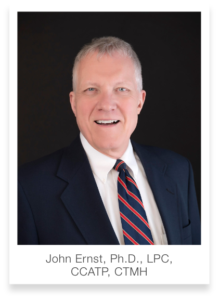
John Ernst, PhD, LPC
Talks About…
DREAM A LITTLE DREAM
Recently, there has been an increased focus on the importance of getting adequate, productive sleep. National Sleep Awareness Week was March 14-20, World Sleep Day was March 19th, and March has been designated as Better Sleep Month.
Sleep is important to all of us, and there are various theories about why we need it, how it benefits us, and how we can go about achieving it. Nonetheless, it restores us biologically, helps us to maintain a positive mood, and improves our focus and concentration.
The simple explanation is that we all have a sleep-wake cycle controlled by our internal circadian rhythms (personal biological clocks) and that a natural sleep hormone, melatonin, is regulated by our exposure to light. Due to the demands of our busy schedules, sleep sometimes becomes a low priority, and people cheat themselves out of its restorative benefits. Many adults need about 7-9 hours of sleep, but this varies among individuals. Although getting enough sleep can help us, we often don’t do enough of the proper things to promote it. Thus, many people are walking around needlessly sleep deprived.
But there are some simple steps you can do to sleep better:
- Slow down before going to sleep and avoid activities that are overstimulating, either mentally or physically. Limit caffeine, alcohol, smoking, and food consumption before you go to bed. The whole point here is to wind down and allow your body and mind to ease into sleep.
- As much as possible, turn your bedroom into a sleep-friendly environment. Keep it quiet, dark, and cool in temperature. Remove, or at least shut off, the TV, the computer, video games, and your cell phone.
- Maintain a regular sleep-wake schedule, meaning that you go to sleep and wake up at the same times as much as possible. Sure, some deviation is fine, but treat your biological clock with kindness.
- Losing sleep tonight because of worry or anxiety will only impair your ability to effectively function tomorrow. Instead, think positive thoughts about what you’re grateful for in your life or recall past pleasant memories. Above all, don’t ‘calculate’ or attempt to solve problems when attempting to sleep, because an active mind is not a sleep-ready mind.
- If you have to remember something for the next day, just write it on a note and put it on your purse or wallet so you’ll be sure to see it – then it’s no longer cluttering your ’bedtime’ mind.
Overall, remember that you are in bed to sleep, and that’s it – period. So, give yourself the ‘gift’ of sleep and gently turn off your thoughts, knowing that sleep is a very healthy human function that you can easily give to yourself on a nightly basis. Just dream a little dream.
Copyright 2021 – John Ernst, Ph.D., LPC
John Ernst, PhD, LPC treats children, adolescents, families, individual adults and couples. He is presently accepting new patients. To establish an appointment, please contact Dr. Ernst at 414-329-7000 and ask for him specifically to discuss your initial questions.
